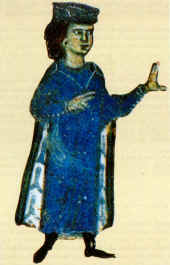Pos de chantar
Duke of Aquintane Guilluame IX 1071 – 1127
Pos de chantar m'es pres talentz,
Farai un vers don sui dolenz:
Mais non serai obedienz,
En Peitau ni en Lemozi. Translation:
As the desire to sing takes hold of me,
I will make a song about my sorrow;
I will no longer be a servant of love
In Poitou nor in Limousin.
Qu'era m'en irai en eisil:
En gran paor, en grand peril,
En guerra laissarai mon fil,
E faran li mal siei vezi.
For now I will go into exile:
In great fear, in great peril,
In war, I will leave my son
And his people will harm him.
Lo departirs m'es aitan grieus
Del senhoratge de Peitieus!
En garda lais Folcon d'Angieus
Tota la terra e son cozi.
The departure from the realm
Of Poitiers is so difficult for me!
I leave Foucon of Angers in charge
Of all the land and of his cousin.
Si Folcos d'Angieus no.l socor,
E.l reis de cui ieu tenc m'onor,
Faran li mal tuit li pluzor,
Felon Gascon et Angevi.
If Foucon of Angers does not help him
And the king from whom I hold my realm,
Many people will bring him harm,
Treacherous Gascons and Angevins.
Si ben non es savis ni pros,
Cant ieu serai partiz de vos,
Vias l'auran tornat en jos,
Car lo veiran jov' e mesqui.
If he is neither wise nor mighty
When I will have left you,
They will soon overthrow him
For they will see him young and weak.
Merce quier a mon compaignon
S'anc li fi tort qu'il m'o perdon;
Et ieu prec en Jesu del tron
Et en romans et en lati.
I seek mercy on my companion
If I have ever wronged him, may he pardon me,
And I pray to Jesus on the throne,
In French and in Latin.
De proeza e de joi fui,
Mais ara partem ambedui,
Et eu irai m'en a scellui
On tut peccador troban fi.
I have might and joy,
But now we all part,
And I go to the One
With whom all sinners find peace.
Mout ai estat cuendes e gais,
Mas Nostre Seigner no.l vol mais;
Ar non puesc plus soffrir lo fais,
Tant soi aprochatz de la fi.
I have been most jovial and joyful,
But our Lord wants that no more;
Now I can suffer this burden no longer
Since the end draws so near.
Tot ai guerpit quant amar sueill,
Cavalaria et orgueill;
E pos Dieu platz, tot o acueill,
E prec li que.m reteng' am si.
I have left behind all that I once loved
Chivalry and pride;
And since it pleases God, I accept all that
And pray Him to retain me in His presence.
Toz mos amics prec a la mort
Que vengan tut e m onren fort,
Qu'eu ai avut joi e deport
Loing e pres et e mon aizi.
I pray all my friends, at my death
That they all come and give me great honor,
For I have known joy and pleasure
Far and near and in my realm.
Aissi guerpisc joi e deport
E vair e gris e sembeli.
Thus I renounce joy and pleasure
The brown, grey, and sable furs.
Font size:
Submitted on May 13, 2011
Modified on April 09, 2023
- 2:45 min read
- 63 Views
Quick analysis:
| Scheme | AAAB CDEB FFFA FFBG AAAA HCXB DDDE GHXA AAAI CXGI BBXJ BCXB EJFK XJBA AAAK FXLX FFFA JJJA JJJA XLLH JF LA |
|---|---|
| Closest metre | Iambic pentameter |
| Characters | 2,708 |
| Words | 537 |
| Stanzas | 22 |
| Stanza Lengths | 4, 4, 4, 4, 4, 4, 4, 4, 4, 4, 4, 4, 4, 4, 4, 4, 4, 4, 4, 4, 2, 2 |
Translation
Find a translation for this poem in other languages:
Select another language:
- - Select -
- 简体中文 (Chinese - Simplified)
- 繁體中文 (Chinese - Traditional)
- Español (Spanish)
- Esperanto (Esperanto)
- 日本語 (Japanese)
- Português (Portuguese)
- Deutsch (German)
- العربية (Arabic)
- Français (French)
- Русский (Russian)
- ಕನ್ನಡ (Kannada)
- 한국어 (Korean)
- עברית (Hebrew)
- Gaeilge (Irish)
- Українська (Ukrainian)
- اردو (Urdu)
- Magyar (Hungarian)
- मानक हिन्दी (Hindi)
- Indonesia (Indonesian)
- Italiano (Italian)
- தமிழ் (Tamil)
- Türkçe (Turkish)
- తెలుగు (Telugu)
- ภาษาไทย (Thai)
- Tiếng Việt (Vietnamese)
- Čeština (Czech)
- Polski (Polish)
- Bahasa Indonesia (Indonesian)
- Românește (Romanian)
- Nederlands (Dutch)
- Ελληνικά (Greek)
- Latinum (Latin)
- Svenska (Swedish)
- Dansk (Danish)
- Suomi (Finnish)
- فارسی (Persian)
- ייִדיש (Yiddish)
- հայերեն (Armenian)
- Norsk (Norwegian)
- English (English)
Citation
Use the citation below to add this poem to your bibliography:
Style:MLAChicagoAPA
"Pos de chantar" Poetry.com. STANDS4 LLC, 2024. Web. 19 Apr. 2024. <https://www.poetry.com/poem/8316/pos-de-chantar>.



Discuss the poem Pos de chantar with the community...
Report Comment
We're doing our best to make sure our content is useful, accurate and safe.
If by any chance you spot an inappropriate comment while navigating through our website please use this form to let us know, and we'll take care of it shortly.
Attachment
You need to be logged in to favorite.
Log In